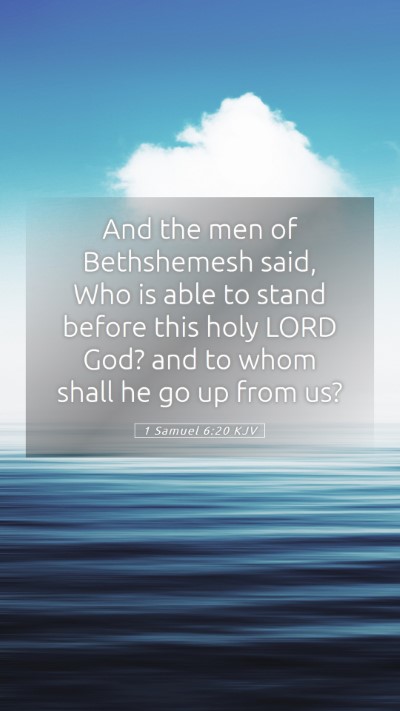Bible Verse Meaning and Commentary on 1 Samuel 6:20
Verse: "And the men of Beth-shemesh said, 'Who is able to stand before the Lord, this holy God? And to whom shall he go up from us?'" (1 Samuel 6:20)
Overview
This verse occurs as the Israelites experience a profound realization of God's holiness and power. Focusing on their reaction upon the return of the Ark of the Covenant, this passage emphasizes themes of reverence, fear, and the acknowledgment of divine authority.
Interpretation and Context
Excerpts from various public domain commentaries shed light on how to interpret this scripture:
-
Matthew Henry: Henry notes that the men of Beth-shemesh were struck with a sense of God's greatness and their own unworthiness. The Ark's return, which should have been a cause for celebration, instead revealed the seriousness of standing before a holy God. Henry emphasizes that the question, "Who is able to stand before the Lord?" reflects a deep understanding of God’s holiness and their need for reverence.
-
Albert Barnes: Barnes highlights the fear and awe that accompanied the presence of the Ark. He draws attention to the acknowledgment of God’s holiness and reflects on the human inclination to distance oneself from divine judgment. This reaction illustrates the serious implications of encountering God and the importance of purity when approaching Him.
-
Adam Clarke: Clarke explains that this verse records the lamentation of the people, revealing their consciousness of sinfulness. He discusses how their rhetorical questions showcase their dismay at God’s presence and their realization that they were not prepared for such a holy encounter. Clarke’s insights underline the need for spiritual readiness when approaching God.
Theological Significance
1 Samuel 6:20 serves as a reminder of the holiness of God and human insufficiency. The men of Beth-shemesh recognized their unworthiness, provoking a fundamental question about the approach to God:
- God’s Holiness: The verse underscores that God is holy and should be approached with the utmost reverence.
- Human Condition: It points to the inherent sinfulness of humanity and the need for atonement and cleansing before communion with the Divine.
- Divine Judgment: Questions about where God should go also signify the looming fears of divine judgment and separation.
Application of the Verse
For modern readers, 1 Samuel 6:20 identifies essential principles for understanding Scripture and applying biblical truths:
- Approach God with Reverence: Just as the men acknowledged their unworthiness, we should recognize that God’s presence is serious and worthy of our respect.
- Self-Examination: Reflecting on our lives in light of God's holiness can lead to personal repentance and growth.
- Seek Guidance: The men’s question signifies a desire for direction. Believers today should seek guidance from Scripture and spiritual leaders.
Related Bible Cross References
- Exodus 19:21-24 - God's holiness and the boundaries for approaching Him.
- Isaiah 6:5 - Isaiah's recognition of his own sin in the presence of a holy God.
- Hebrews 12:14 - Striving for holiness, as seeing God requires purity.
Conclusion
The inquiry of the men of Beth-shemesh reflects a timeless dilemma: how do we, as fallible beings, stand before a holy God? This verse captures the essence of biblical exegesis, emphasizing that in understanding Scripture, we recognize God's transcendent holiness and our need for a Savior. It is through the lens of humility and awe that one begins to grasp the meaning of Bible verses, leading to deeper insights and applicable lessons in our lives.
Further Study and Resources
To gain a more profound understanding of this verse and similar passages, consider participating in Bible study groups or seeking Bible study resources available through various platforms. Engaging in online Bible study can also provide dynamic insights and community discussions that deepen understanding.


